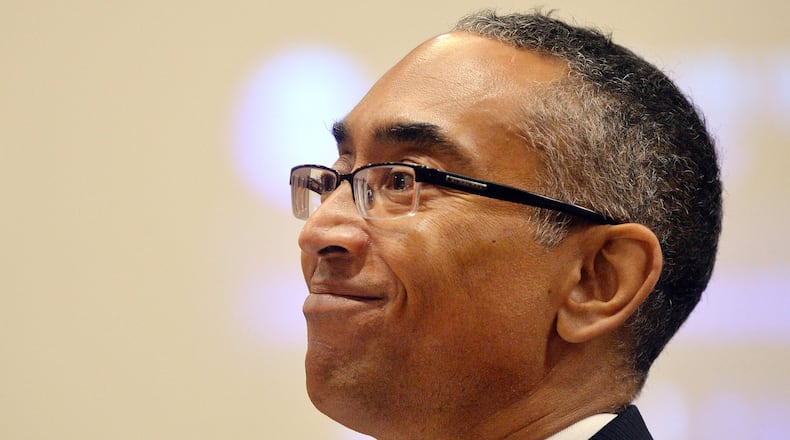The state's highest court delivered a stunning blow Wednesday to DeKalb County prosecutors when it threw out the conviction of CEO Burrell Ellis, ruling that he was denied a fair trial.
The Georgia Supreme Court's unanimous decision erases a jury's conclusion in July 2015 that Ellis was guilty of attempted extortion and perjury. The court found that the judge in the case shouldn't have prohibited testimony that could have helped clear Ellis.
Ellis, 59, already served an eight-month prison sentence and was released in March. He remains suspended from the office he was twice elected to, and the charges against him are still pending.
“We find that the evidence presented at trial was sufficient to enable a rational trier of fact to find Ellis guilty … beyond a reasonable doubt,” wrote Justice Harold Melton. “We must nevertheless reverse Ellis’ convictions based on certain evidentiary errors that occurred at his trial.”
Ellis was the most high-profile DeKalb official convicted in a series of government corruption scandals that plagued the county. Others include former Commissioner Elaine Boyer, former schools Superintendent Crawford Lewis and dozens of former county employees.
It's now up to incoming DeKalb District Attorney Sherry Boston to decide whether to seek a retrial. Ellis already has gone to court twice on the charges. His initial case ended in a mistrial in October 2014 when jurors couldn't reach unanimous verdicts on any of the counts against him, and he was found guilty of four felonies after his second trial.
Even if Boston drops the case against Ellis, he won’t return to office. His second four-year term ends at the end of this year, and DeKalb’s newly elected CEO, Mike Thurmond, takes office Jan. 1.
Boston has previously questioned whether Ellis should have been retried.
“It is a very expensive endeavor — the first time, let alone the second time,” Boston said on “Morning Edition” on WABE-FM before the May primary election. “Like many others in the community, (I) question whether trying the case a second time was in the best interests of the county.”
Boston said in a statement Wednesday it would be inappropriate to discuss her intentions until she takes office Jan. 1.
Ellis’ attorney, Craig Gillen, said he’s pleased with the Georgia Supreme Court’s ruling, but he declined to comment further until Thursday.
Ellis was convicted of trying to shake down Power and Energy Services for a $2,500 campaign contribution and threatening to end its $250,000 contract with the county. Ellis was also found guilty of perjury for lying under oath about his role in awarding county contracts.
The company’s president, Brandon Cummings, didn’t return a phone message seeking comment Wednesday.
District Attorney Robert James is “disappointed” in the Georgia Supreme Court’s ruling, said spokesman Marcus Garner. Prosecutors are considering whether to file a motion for reconsideration.
“We appreciate that the court noted that there was sufficient evidence to support convictions for perjury and criminal attempt to commit theft by extortion,” Garner said in a statement.
Ellis, who has been suspended from office since he was indicted three and a half years ago, could attempt to recover back pay if the charges against him are dropped.
Ellis’ $157,000 annual salary was cut off when he was convicted, but Georgia law allows him to receive withheld compensation if he’s reinstated to office. It’s unclear whether he could be reinstated retroactively after his term ends this year.
In all, Ellis’ withheld pay over the last 18 months amounts to about $235,500.
The Supreme Court found two significant violations of Ellis’ rights to a fair trial.
DeKalb Superior Court Judge Courtney Johnson should have allowed Ellis’ defense team to have county contractors testify that they didn’t feel they were threatened after declining to donate to his campaign, the high court said. Prosecutors “created an impression that Ellis had a general policy of pressuring vendors,” and he should have been able to defend himself by presenting evidence about his interactions with contractors.
The trial court also erred in the testimony it allowed from a member of a special purpose grand jury, which led to the perjury verdict, according to the ruling.
Ellis, a real estate attorney, could seek to have his law license reinstated if the charges against him are dismissed. Ellis voluntarily surrendered his license in October 2015.
About the Author
Keep Reading
The Latest
Featured




